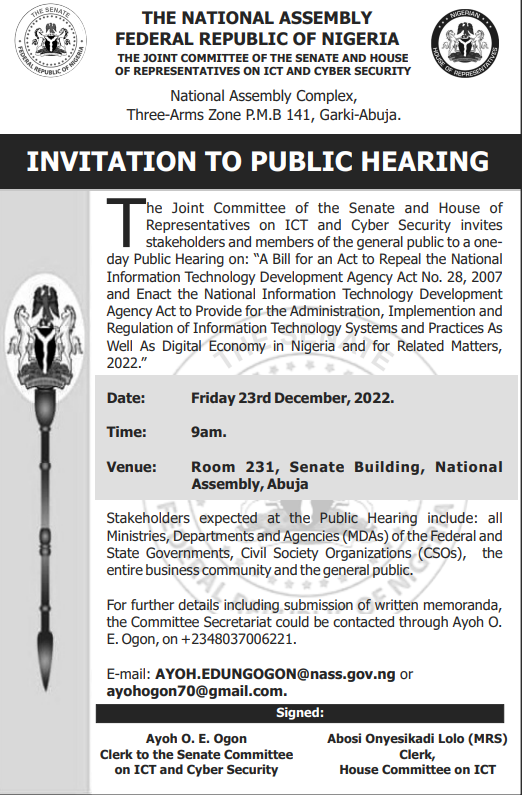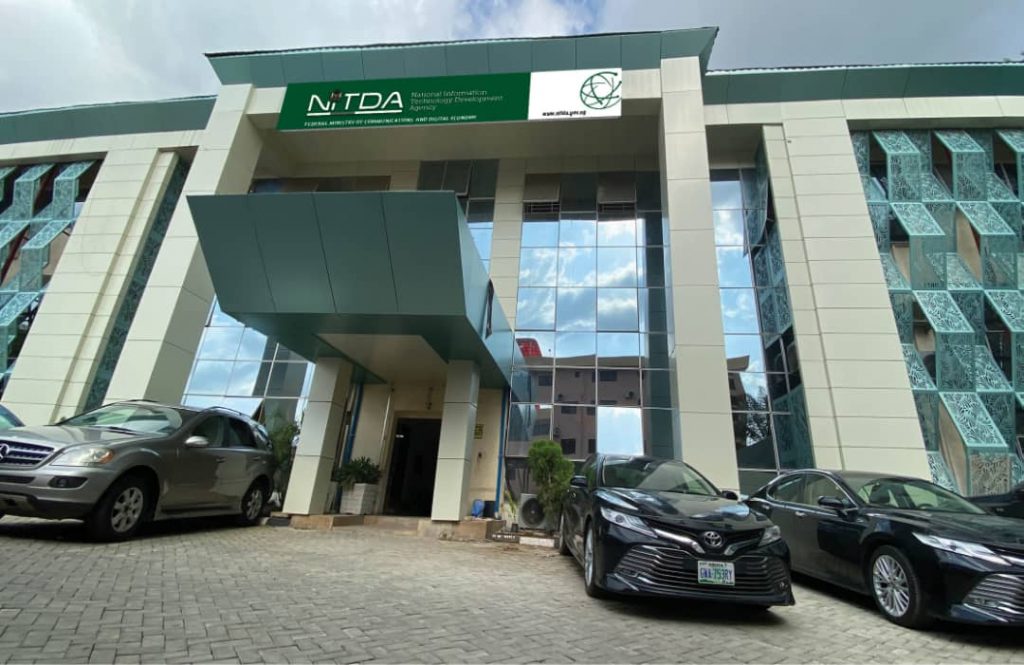Nigeria’s National Assembly is inviting the public to a one-day public hearing on the draft bill for the country’s ICT regulator, NITDA.

First proposed in 2021 by NITDA director-general, Kashifu Abdullahi, the bill seeks to repeal the National Information Technology Development Act No 28 of 200, and enact the National Information Technology Development Agency Act.
The amendments in the proposal include provisions for new license categorisations, licensing fees, 1% profit-before-tax levies for companies with revenues higher than ₦100 million ($243,831), and prison sentences for defaulting parties.
Earlier this year, in July 2022, TechCabal broke news of the Federal Executive Council’s (FEC) consideration of the bill. Now, the bill has moved a step further with its entry into the National Assembly. On December 23 at the National Assembly in Nigeria, the legislative will hold a public hearing where stakeholders in Nigeria’s tech ecosystem can weigh in on the bill.
Nigeria’s duplicitous tech laws
Since its announcement, the bill has generated a healthy amount of controversy surrounding its purpose and its incompatibility with other tech-related bills, most notably the recently-enacted Startup Bill.
In October 2022, Nigerian president Muhammadu Buhari passed the Nigeria Startup Act (NSA), an Act created in collaboration with 30 tech leaders including the SSA on digital transformation to President Buhari, Oswald Guobadia, Ventures Platform founder Kola Aina, NITDA officials, and the minister of digital economy Isa Pantami. Adherents of the NSA have criticised NITDA’s draft bill and raised alarm on the duplicity of the bill.
“The NSB was created to avoid bills like NITDA’s. It’s also quite incompatible with the NITDA bill,” said Davidson Oturu, a partner at Aelex Legal, in a call with TechCabal in July.
Noting the contrasting provisions, Oturu mentioned that the NSB—now NSA—has provisions for tax breaks for new startups but the NITDA bill is focused on taxing startups. In Part VI, Section 16, the bill provides for the creation of the NITDA Fund which will be used for the “advancement of digital economy and related purposes”. The problem, according to Oturu, is not with the purpose of the fund, but with the constitution of the fund. In subsection (a), the bill states that all companies with annual turnovers over ₦100 million ($240,000) will be required to pay an annual levy worth 1% of their profit before tax.
Nigerian startups are already subject to other taxes including a 20% tax paid to the Federal Inland Revenue Service (FIRS) for companies with over ₦25 million in turnover, and an education tax worth 2.5% of their assessable profit per year for all registered startups.
Victoria Manya, executive director at Advocacy for Policy and Innovation (API) also highlighted the issues in Part VI, a segment many consider the most troublesome part of the draft bill.
Titled “Offences and Penalties”, Part VII lists out offences and penalties such as a ₦30 million fine and 2 years imprisonment for operating without licenses. Startups and companies who also fail to pay the annual 1% levy fined 2% of the unpaid levy. Where the company refuses to pay the levy within 2 months after the notice, the company will be liable to pay 0.5% of the payable amount per day.
“The provision in section 25 has also made NITDA a judge in its own course,” said Manya. “Where do we begin to understand the motivation behind criminalizing an already unjust situation.”
Can stakeholders save the day?
In the making of Nigerian laws, public hearings are part of the early stages of a long process.
In its invitation, the National Assembly invites all tech stakeholders including civil society organisations (CSOs), ministries and the “entire business community” which in this case includes the Nigerian tech ecosystem.
“There’s enough time for techpreneurs to raise their voices,” Oturu recommended. “Techpreneurs can prepare a position paper and share it with the Ministry of Justice. And if that doesn’t work, the National Assembly, at the Committee Stage, will call for stakeholders to send in their memorandum and voice their concerns at a public hearing. The most important thing to do right now is to speak up and voice concerns.”






















